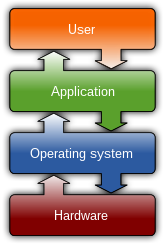With Ada Lovelace Day fast approaching (Oct 13) the BBC has released a timely documentary all about her called "Calculating Ada: The Countess of Computing". This is the first documentary I've seen dedicated to Ada Lovelace and I learnt a lot. For instance I didn't know that she lost a fortune gambling on horse racing. She believed she could calculate the odds better than the bookmakers - she was wrong. The doco is available on YouTube, though I expect it will be taken down soon; otherwise it can be viewed on the BBc iPlayer.
Wednesday, September 30, 2015
Tuesday, September 22, 2015
Build your own satellite
Honestly! It seems as if increasingly there is no activity that dedicated amateurs aren't willing to have a go at. Formerly, building satellites was done by NASA and specialists like the Jet Propulsion Laboratory but thanks to greatly simplified design, called CubeSat, radio amateurs our building and launching their own communications satellites into low Earth orbit. They even have their own governing organisation called AMSAT. So if you have a project that needs its own communications satellite why not build your own.
Wednesday, September 16, 2015
Amazon at 20: what has the online giant ever done for retail?
You may not have noticed but Amazon recently celebrated it's 20th birthday. You may or not be a regular user (I certainly am). It was originally billed a the “Earth’s Biggest Bookstore” featuring over one million titles. Twenty years later it has over 270m active accounts and claims to have more than 2m third-party vendors selling millions of products through its marketplace platform. Amazon is comfortable with the term "disruptive." It's disrupted the bookshop and publishing industries and is disrupting other retail industries. The Guardian recently published an interesting article about the impact Amazon has had - recommended.
Thursday, September 10, 2015
The George operating system
I came across this intriguing news story the other day about a group of school students from St Thomas of Canterbury College in Christchurch NZ who have made an operating system, called George, that uses games and tests to teach basic literacy and numeracy. The educational OS is designed to run on old (semi-obsolete) computers. Unfortunately, apart from this news story I can find no other information about this at all. It seems they have neglected to make a web page to describe their innovation. It gets more confusing because (news to me) it turns out there used to be an OS called George that ran on International Computers and Tabulators (ICT) mainframe computers in the 1960s. So if anyone reading this has any more information on the (new) George OS please contact me.
Tuesday, September 8, 2015
Sprout an all-in-one computer and 3D scanner
This product caught my eye the other day - sprout, by HP, is billed as "a revolutionary all-in-one computer and 3D scanner that makes it easy to go from thought to expression in an instant." Basically sprout combines a digital scanner seamlessly with a home PC enabling 3D models of objects to be easily captured. These can then be manipulated as necessary and printed with a 3D printer. The obvious idea behind this product is to make the 3D model capture process family friendly. Good on HP for trying this and it will be interesting to see if sprout is a success. I can see schools liking it and the odd hobbyist but beyond that I'm not so sure. Their product page implies that professional designers might use sprout in their design studios, but I'm sure they would use more professional products. It reminds me of the HP TouchSmart PC that I was asked to review a few years ago. This was intended to be a digital hub for a family, probably sitting in the kitchen - HP's promotional photograph showed a nuclear family having a meal with the TouchSmart sitting on a kitchen bench. However, I've never seen one of these subsequent to my review and can only conclude that TouchSmart didn't catch on and family members now use their personal digital devices (smart phones and tablets) instead. With regard to the sprout I can see hobbyists preferring to use separate, more flexible and powerful digital scanners. So this just leaves schools as sprout's potential market.
Thursday, September 3, 2015
The Internet Is Failing The Website Preservation Test
I blogged a few months back about the increasing problem of dead links (known as link rot) on research web sites. Not surprisingly this problem is not isolated to academic websites. An article by Rob Miller in TechChrunch, called "The Internet Is Failing The Website Preservation Test," makes the case for a a digital Library of Congress to preserve and protect all of the content on the internet to counter this growing problem. Preserving the integrity of the web for posterity cannot he (and others) argue be left to content publishers or non-profits like the Internet Archive's Wayback Machine or the British Library's UK Web Archive. The web is such a vital information source to us all know it must be preserved for future historians.
Tuesday, September 1, 2015
Will a robot take your job?
With robotic technology advancing at a pace there is the obvious prospect that robots will start to perform a wider range of services and tasks and not be limited to factory manufacturing as they are at the moment. A recent article in Wired called "Robots Will Steal Our Jobs, But They Will Give Us New Ones" makes the argument that although many current jobs will be taken by robots new opportunities will arise - the most obvious of which is servicing and maintaining all the robots. Incidentally the photo here is of a robot that can cook a hamburger and the Japanese have robots that can prepare Ramen noodles.
Subscribe to:
Posts (Atom)



